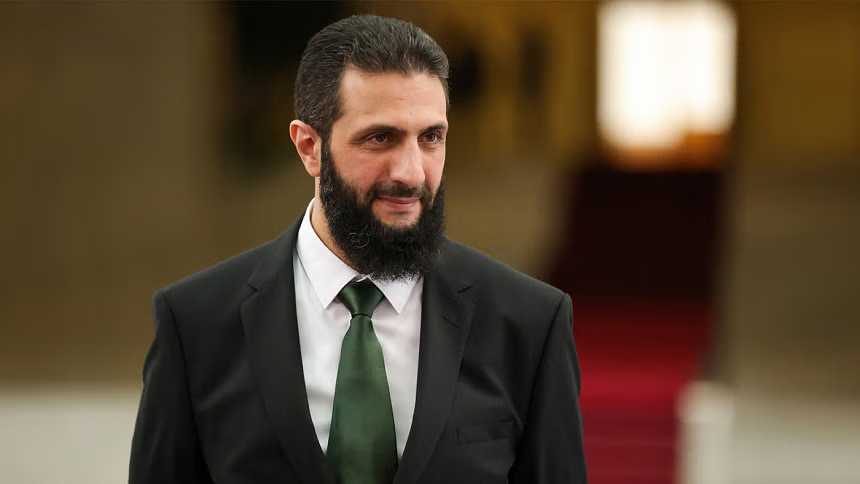News Flash

DAMASCUS, June 6, 2025 (BSS/AFP) - From wanted jihadist to statesman embraced by world leaders, Syria's interim President Ahmed al-Sharaa has undergone a stunning transformation in just six months since ousting longtime strongman Bashar al-Assad.
Born in 1982, Sharaa abandoned his nom de guerre Abu Mohammed al-Jolani, trimmed his thick beard and swapped fatigues for a suit and tie since his Islamist coalition of forces seized Damascus on December 8.
He was proclaimed interim president the following month, and later tasked with leading his country through a five-year transitional period under a temporary constitution that experts and rights groups said concentrates power in his hands.
Appearing calm and soft-spoken, Sharaa has sought to shed many of the attributes that once defined him.
Gone is the shadowy persona associated with a single mugshot released at the height of the US-led war in Iraq following his capture there by American forces.
Videos posted online in recent weeks have shown him, a tall man, playing basketball in a shirt and tie alongside his foreign minister.
Others show him driving his car in Damascus, or eating in a working-class restaurant to cheers from passers-by.
"I think he has succeeded in his transformation," said Jerome Drevon, a specialist in Islamist militancy at the International Crisis Group.
In a matter of months, Sharaa has visited Europe and been "accepted on the whole in the (Middle East) region -- even by countries like the United Arab Emirates and Saudi Arabia that are not at all supporters of Islamists, much less jihadists", he added.
The reception Sharaa has received demonstrates "a real recognition of the new authorities", he told AFP.
- 'No alternative' -
On Sharaa's first trip to the West last month, he met French President Emmanuel Macron in Paris.
Just a week later during a trip to Riyadh, he shook hands with US President Donald Trump who announced Washington would lift sanctions on Syria, a triumph for the new authorities.
Trump described Sharaa as a "young, attractive guy. Tough guy. Strong past. Very strong past. Fighter."
Sharaa remains under United Nations sanctions and a travel ban, and must request an exemption for all foreign trips.
Drevon said that Arab and Western countries had made a pragmatic choice by supporting the young leader.
"There are still security problems, there are tensions inside the country, but I think that most foreign countries recognise that right now, there is no alternative," he said.
Sharaa has set up in what was once Assad's presidential palace overlooking Damascus, receiving a steady stream of senior foreign officials.
During a Muslim holiday around two months ago, he and his wife Latifa al-Droubi, who now appears with him in public on occasion, welcomed Syrian orphans there.
While seeking to distance himself from his guerrilla past, he has sought to extract political capital from his rebel roots.
Last week, he presided over a cabinet meeting, saying: "We came to power through revolution -- we aren't used to luxurious palaces."
"Until two years ago, I didn't even have an office. We used to meet in the car, on the street, under an olive tree," he added, referring to his time in the former rebel bastion of Idlib in northwestern Syria.
- 'Pragmatic radical' -
In January, authorities announced the dissolution of all armed groups, including Sharaa's Hayat Tahrir al-Sham, which led the lightning offensive that toppled Assad.
HTS was known as the Al-Nusra Front before it broke ties with the Al-Qaeda jihadist network in 2016.
Sharaa is "a pragmatic radical", said Thomas Pierret, a specialist in political Islam.
Born in Saudi Arabia, Sharaa is from a well-to-do Syrian family and was raised in Damascus's upscale Mazzeh district.
He started studying medicine but then became associated with underground Islamist circles.
Following the US-led invasion of neighbouring Iraq in 2003, he and other Syrians crossed the border to join what they saw as a resistance to foreign occupation.
He joined Al-Qaeda there, and was subsequently detained for five years.
In March 2011, when the revolt against Assad's rule erupted in Syria, Sharaa returned home and founded the Al-Nusra Front.
A realist in his partisans' eyes, an opportunist to his adversaries, Sharaa said in May 2015 that he had no intention of launching attacks against the West -- unlike his adversaries in the Islamic State jihadist group.
In 2017, Sharaa imposed a merger with HTS on rival Islamist groups in northwestern Syria, claiming control of swathes of Idlib province.
HTS went on to develop a civil administration in the area, amid accusations of brutal abuses against those who dared dissent.